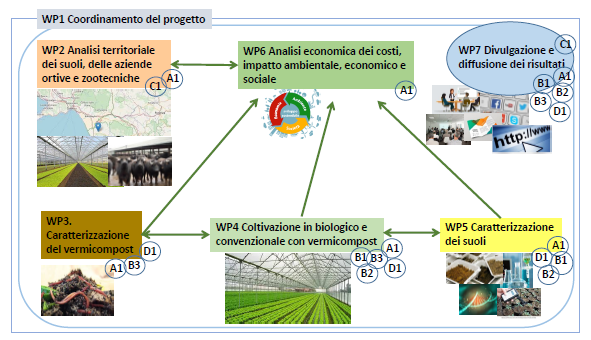Sustainable management of soil fertility in the Sele Plain to produce ready-to-eat food crops under greenhouse through organic amendment deriving from local livestock sector

The general objective of the FertiSele project is to test vermicompost, a low cost soil organic amendments for farms of the Sele Plain producing ready-to-eat crops in order to respond to needs of this sector to increase fertility of soils. Exploiting the presence, in the same area, of anaerobic digestion plants networked with organic buffalo farms, an example of circular economy to be disclosed and reproduced in the Sele Plain, and also in other situations where horticultural crops and livestock farms can build a network is proposed.
The project intends to produce ready-to-eat food in organic and conventional protected cultivation in two farms in the Sele Plain by testing vermicompost as soil conditioner and biostimulant. Specific soil plots will be prepared to verify the possible value of vermicompost in replacing solarization, a technique adopted to control telluric pathogens. Crops will be evaluated in each plots proposed to quantify the expected improvement in quality and quantity. Analysis of the environmental and socio-economic impact of the obtained results will validate the proposed innovation. Dissemination and dissemination of results will ensure contact with stakeholders.
The Sele Plain covers an area of 50,951 ha with a utilised agricultural area of 28,850 ha. Vegetable crops are concentrated in the terraced, alluvial and coastal plain areas and mostly concern (4800 ha in winter and 1500 ha in summer in protected cultivation of which 12% organic) productions destined for ready-to-eat food (rocket, spinach , lettuce, etc.) which are becoming the flagship for the region's horticulture. About 760 companies are involved with 15 producer organizations that are going to invest in product quality and innovation in agricultural management. The strong problem they face is above all the loss of soil fertility as consequence of intensive agriculture. The organic matter recovery is guaranteed in part by green manure but this practice implies loss of months of production. Soil organic amendment becomes necessary but unfortunately the simple use of manure is not compatible with the strict rules of the production of Iready-to-eat food. The Sele Plain area also produces large amounts of animal sludge waste from the activities of 311 buffalo and 276 cattle farms. In this reality there are some anaerobic digestion plants for animal sewage sludge waste that use solid digestate to produce vermicompost. This latter is pathogen-free, non-phytotoxic compost, rich in organic matter and nutrients, also able of containing telluric pathogens and stimulating plant growth. It would be desirable to develop a greater number of networks in the virtuous recycling of animal waste water and in the production of quality soil conditioner having low environmental impact.
POI FERTISELE intends to validate an organic soil conditioner, a quality vermicompost trying to remove possible resistances and objections to the use of organic soil amendments from animal sewage sludge waste in the sector of ready to eat food, where the regulations are very stringent. The proposed vermicompost from an entirely organic production cycle can be used by farms under conventional management and those, in continuous expansion, under organic farming. Thus, at local level, the conversion of conventional farms to organic management would also be encouraged. Qualification of such a virtuous supply chain with a "quality stamp" that highlights the "eco-friendly" process could also be hypothesized.
A desirable outcome would be that in the Piana del Sele and in the other Campani areas it is possible to create production systems equipped with integrated energy and vermicompost production systems, supported by network of agricultural and livestock companies in the same area, also interested in a sustainable placement of wastewater. In fact, it is an area where the combination of the interests of horticulture and livestock farms could lead to a common sustainable management of circular economy towards which the European Union pushes and which leads to significant economic and social development, but attentive to the environment.
| Titolo/Descrizione | Url | Tipologia |
|---|---|---|
|
Sito web del progetto
|
Sito web
|
|
|
Video del progetto
|
Link ad altri siti che ospitano informazioni del progetto
|
|
|
Video Intervista alla Prof.ssa Maria Antonietta Rao
|
Link ad altri siti che ospitano informazioni del progetto
|
|
|
Video Intervista al Dott. Massimo Zaccardelli
|
Link ad altri siti che ospitano informazioni del progetto
|
|
|
Video Intervista all'Ing. Giancarlo Cattaneo - C&F Energy Società Agricola
|
Link ad altri siti che ospitano informazioni del progetto
|
|
|
Video Intervista all'Ing. Francesca Sorgente
|
Link ad altri siti che ospitano informazioni del progetto
|
|
|
Video Intervista al Dott. Marco Valerio Del Grosso
|
Link ad altri siti che ospitano informazioni del progetto
|